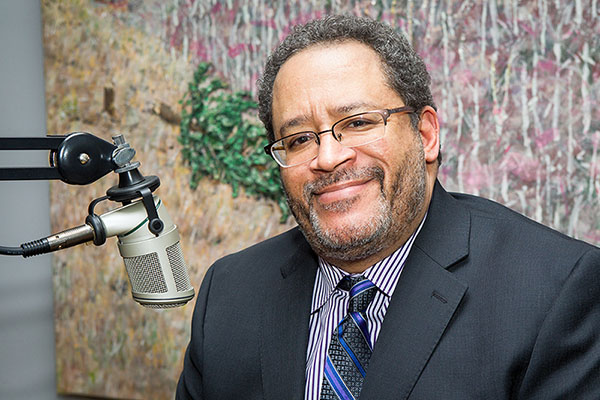In a recent visit to Appalachian State University’s podcast studio, one of America’s foremost African American voices and renowned public intellectuals, Dr. Michael Eric Dyson, shares advice on how to affect change, government and academic leadership, activism and speaking up.
Commentator, professor, activist and author encourages open and honest and exchange of ideas, and empathy in opposition.
Transcript
Megan Hayes: One of the Nation’s most renowned public intellectuals, Dr. Michael Eric Dyson has been named one of the most inspiring African Americans in the United States by Essence Magazine and one of the most influential Black Americans by Ebony Magazine.
MH: His speeches and books provide some of the most significant commentary on modern social and intellectual thought today. Interwoven with a combination of culture criticism, race theory, religion, philosophical reflection and gender studies.
MH: Dr. Michael Eric Dyson welcome back to Appalachian, and welcome to Sound Affect.
Dr. Michael Eric Dyson: Thank you for having me.
MH: I’d like to begin by talking about something that is taking place on our campus right now. Over the past year and a half members of our campus community have, like many other universities, held demonstrations and public discourse focused on race, privilege and marginalization. Just in the past week students here have voiced their opposition to the recently passed Public Facilities Privacy and Security Act, or HB-2, with public demonstrations on our campus and in our community. Our students are connecting Black Lives Matter to this movement broadening it beyond a LGBTQ Plus discussion because it is a symptom of larger oppression. Do you think this inclusion is emblematic of a new millennial form of activism or maybe the next step set in place by Dr. King connecting the Civil Rights movement to poverty?
MED: I think that’s great and I think both are true. This is a logical extension of what Dr. King talked about in terms of fighting militarism, in terms of fighting poverty and in terms of fighting racism.
MED: I think that the millennials are certainly on cue when they are taking their marching orders from history that they have studied, but also the contemporary moment that calls out its own unique action.
MED: The broader that you extend the tent of justice for issues that are impacting human beings and citizens the broader sway you have because you have more numbers of people who feel implicated in particular actions and who feel called to respond in a very decisive and political fashion.
What do you think?
Share your feedback on this story.
About Appalachian State University
As a premier public institution, Appalachian State University prepares students to lead purposeful lives. App State is one of 17 campuses in the University of North Carolina System, with a national reputation for innovative teaching and opening access to a high-quality, cost-effective education. The university enrolls more than 21,000 students, has a low student-to-faculty ratio and offers more than 150 undergraduate and 80 graduate majors at its Boone and Hickory campuses and through App State Online. Learn more at https://www.appstate.edu.












